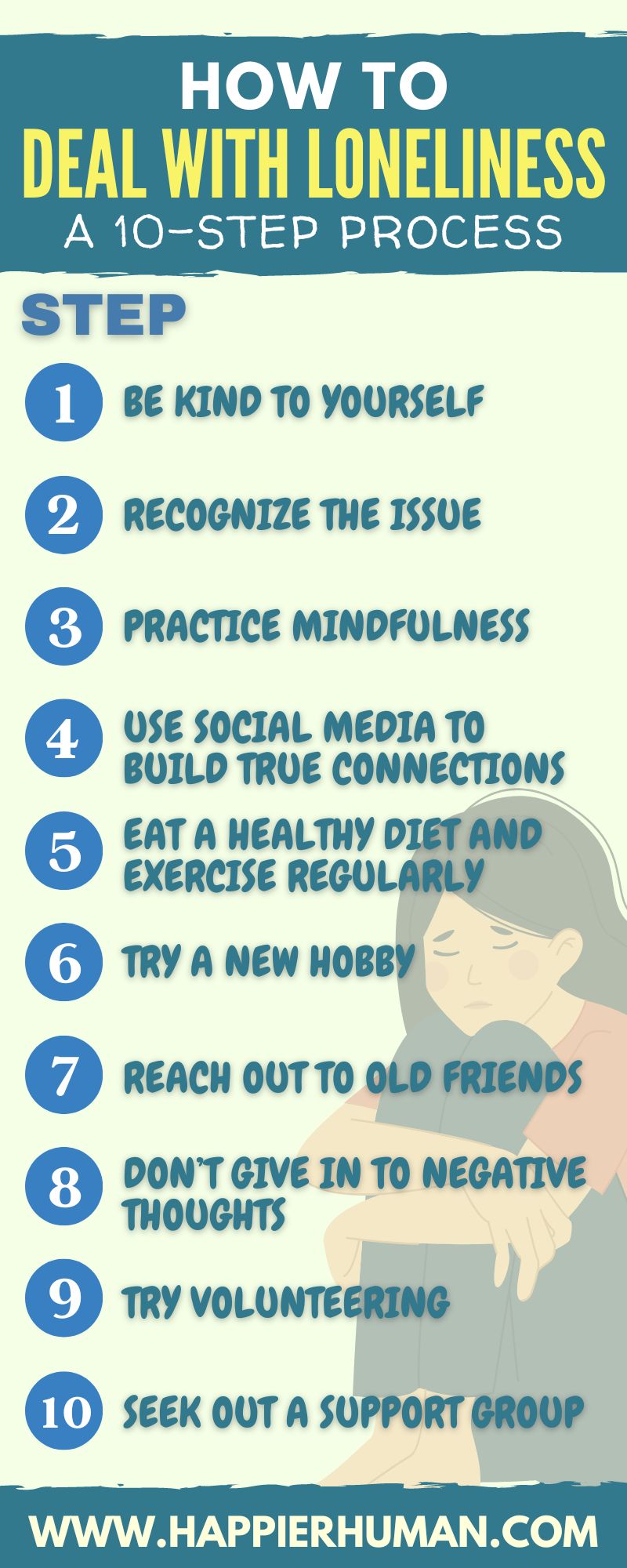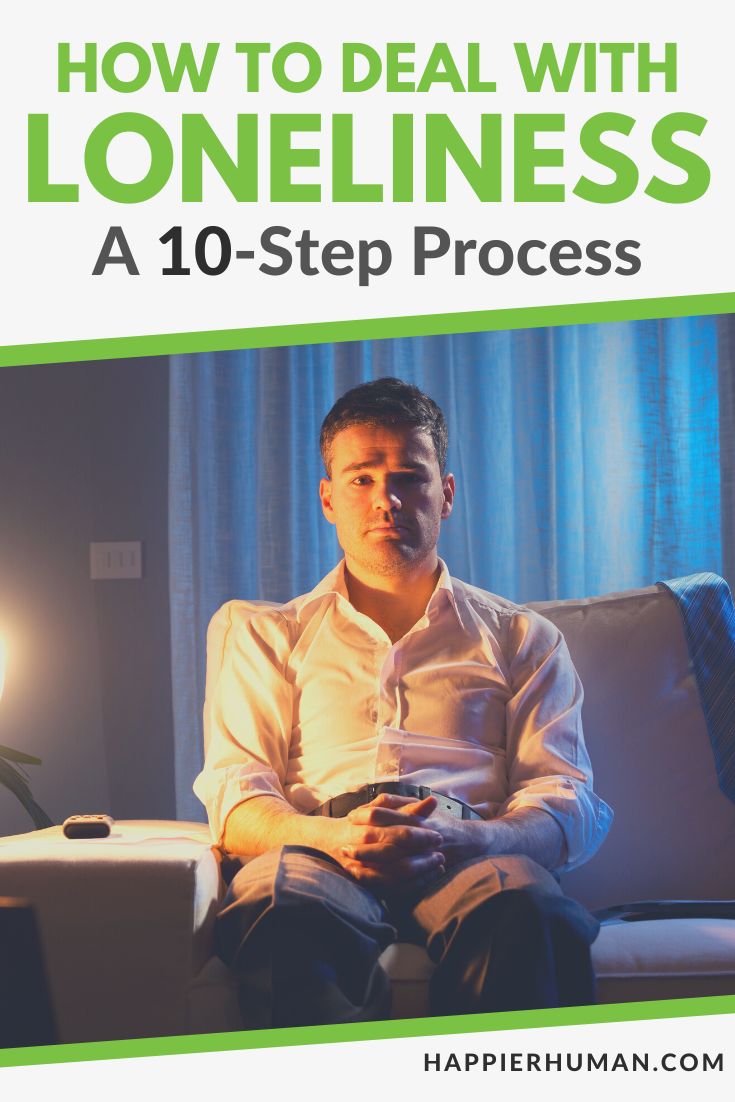Many of us may feel lonely from time to time. Yet, some people feel chronically lonely. If this sounds like you, you’re not the only one.
Living with loneliness is a difficult journey that can leave you feeling isolated and hopeless. However, it can also present several health dangers if it isn’t addressed.
So how can you cope if you’re feeling lonely? In this article, we’ll outline some steps you can take to alleviate loneliness.
What is Loneliness?
As human beings, every one of us longs for connection. We all want to be seen, understood, and loved.
However, sometimes it’s hard to feel that sense of connection that we all need. Loneliness is when a person experiences distress because they feel isolated from the people around them.
Feeling lonely means perceiving distance between the social connection you long for and what you’re actually experiencing. It can also stem from physical separation from other people.
You could feel lonely even in a crowded room or around family or friends. Whatever the cause, loneliness is a very deep, painful emotion.
Reasons Why You Might Feel Lonely
Anyone can struggle with loneliness, and it may be for any number of reasons. Every phase of life presents its own challenges, and many of them can lead to loneliness.
For example, a school-age child can experience loneliness if they feel like they don’t fit in. They may feel lonely because they’re shy and have a hard time making new friends.
Some people can experience loneliness after losing a loved one, such as a spouse. Understandably, not having that important person by your side can lead to a profound sense of loss and isolation.
Going through a breakup can also cause loneliness as you transition from being in a relationship to being single.
You could feel lonely after moving far away from friends and family, starting or losing a job, or going to college for the first time. Living with a physical illness or disability could also make you feel lonely.
The global pandemic likely worsened feelings of loneliness for lots of people, as we had to practice social isolation and physical distancing. Many people began working or attending school from home, further removed from their social connections.
Older people are particularly at high risk for loneliness. This is because they often live alone or far from their families. They could also be dealing with significant life changes like retirement, the loss of a spouse, or chronic illness.
Ironically, social media can be a culprit for loneliness. We live in an age of incredible technological connection. But all of that social media and phone use may actually be causing us to feel more disconnected from each other.
6 Dangers of Living with Loneliness
Loneliness can take many shapes and have a variety of causes. Yet, whatever the cause, living with loneliness can have dangerous effects on your well-being over the long term – both psychological and physical.
1. Depression
Coping with loneliness can lead to sadness, isolation, and depression. If you’re lonely, you might start to think that you’re unworthy of the connection you need and deserve. Over time you could begin feeling depressed because of this.
Furthermore, the opposite is also true. Depression symptoms can cause you to feel lonely, isolated, and in the dark. When you’re living with depression, it’s easy to feel like you’re a burden or that you have to hide what you’re going through, even though it isn’t true.
2. Anxiety
Loneliness can negatively impact your mental health overall. It can contribute to anxiety and cause you to fear abandonment, being alone, or even being in a group of people. You might end up having social anxiety or think you can’t relate to other people.
3. Low Self Esteem
Loneliness can lead to low self-esteem over time. It can perpetuate a vicious cycle where you feel like you’re alone because you have little worth, but feelings of low worth actually cause you to feel lonely.

Low self-esteem can destroy your self-confidence. It can make you feel like you can’t reach out to others to talk about what you’re going through. Chronic loneliness is detrimental to your sense of self-worth, and having low self-esteem can also make you feel lonely.
4. Physical Health Risks
Besides harming your mental health, long-term loneliness can put you at risk of several physical health risks. Loneliness could put you at higher risk for high blood pressure, cardiovascular disease, obesity, diabetes, arthritis, and stroke. It may also impact brain function, potentially leading to memory problems and changes in the brain.
5. Higher Stress Levels
Chronic loneliness can increase the levels of stress hormones in your body. Stress hormones can have a variety of detrimental health effects over time. Additionally, loneliness can even make you sleep poorly.
6. Decreased Immune System Function
Some research suggests that chronic loneliness causes the body to have a “fight-or-flight” response, putting you into survival mode. This stress response can increase inflammation and knock down your immune system function, negatively impacting your ability to fight illness.
How to Deal with Loneliness: 10 Steps
It’s clear that chronic long-term loneliness is bad news for your physical, mental, and cognitive health, not to mention how damaging it can be to your sense of well-being.
Yet, despite how it may feel, you’re not alone — many people deal with chronic loneliness. Fortunately, there are concrete ways to cope. Here are 10 steps for dealing with loneliness.
Step 1: Be kind to yourself
When you’re feeling lonely, it’s easy to be hard on yourself. You may feel like an island. You may have negative thoughts and feel sad.
So it’s important to put kindness first — not just with other people, but with yourself. Being kind to ourselves can be difficult, especially when we’re in a dark place.
But self-care is vital for healing and coping with loneliness. Give yourself permission to practice self-love and kindness even in your darkest hours.
ACTION PLAN: Instead of blaming yourself or giving in to negative self-talk, try to remember that what you’re feeling isn’t your fault. Rather than allowing negative ideas to take over, try reciting some of these loneliness quotes when you’re down.
Step 2: Recognize the issue
Another step for dealing with loneliness is to simply recognize you’re going through it. Just allowing yourself to acknowledge that you’re struggling can be powerful. Know that even though you feel lonely, you’re not alone.
It’s normal to feel a variety of challenging emotions during such big life changes. Recognizing the truth of your experience may help you cope.
ACTION PLAN: Take time to reflect on what’s going on in your life that could be the source of your loneliness. Have you recently lost a job? Did a child go off to college? Are you grieving a loved one or going through a divorce?
If so, it’s ok to give yourself permission to ask for help. You could also look into different ways to recover after a life setback.
Step 3: Practice mindfulness
Mindfulness can be an excellent way to care for your mental health when you’re lonely. Practicing mindfulness means pulling your attention back to the present moment, the here and now.
Mindfulness doesn’t need to be time-consuming or complicated, either — it coil look like simply taking three deep breaths with your eyes closed. When you’re mindful, you’re fully aware of your surroundings and not dwelling on the past or future.
Mindfulness practice can help you stay grounded and focus on all the things that really matter. Cultivating amazement at the beautiful parts of your life — no matter how small — may help you feel a part of something greater than yourself.
ACTION PLAN: Take a five minute walk in nature to immerse yourself in the sights and sounds. Breathe deeply and focus on the feeling of grass beneath your feet. Concentrate fully on the sensations of the present moment.
Step 4: Use social media to build true connections
Social media can be a double-edged sword. On the one hand, we can use it to communicate with people across continents. We can share ideas, jokes, and blurbs about our daily lives with friends and family, far and near.
However, social media can actually worsen feelings of loneliness. Too much of it can make you feel far away and disconnected. Many people only share the highlights of their lives on social media, which could leave you feeling like your “imperfect” life is lacking.
Still, social media can also be a tool for building real connections with like-minded people. Many apps even allow you to join groups of people with similar interests.
ACTION PLAN: Try finding a common interest group to join. You could also try posting something raw and real on your feed at least once a week. This could be a piece of advice, a favorite quote, or a message about your loneliness. You may be surprised at who resonates with your post.
Step 5: Eat a healthy diet and exercise regularly
Eating a healthy, balanced diet and doing some kind of regular exercise helps improve your overall well-being. Taking care of your body will also help you take care of your mind. Exercise might also help break you out of a negative thought pattern.
Food can also affect your mood, so it’s essential to eat healthy, nutrient-rich foods, especially if you’re dealing with loneliness or depression.
Of course, if you’re living with clinical depression or another mental health issue, diet and exercise alone may not be enough to treat it. But they can help you feel better overall in the long run.
ACTION PLAN: Set a goal to exercise 3 times a week or more, even if it’s only for 15 minutes. Take time one day a week to plan out healthy meals for the coming days.

Step 6: Try a new hobby
Trying out a new hobby can be a way to change up your routine. Not only that, but it’s an opportunity to meet other people who are into the same things.
It could be anything you enjoy! You might try taking music lessons, learning how to make pottery, going to dance class, or trying a new sport.
There may be online or local groups to connect with. You could even try a group activity, like rafting or a wine and paint class, or host a movie night at your house.
ACTION PLAN: Think of a hobby you’ve always wanted to try or get back into. Then, search online for lessons or groups in your area for the same hobby and give them a try. You never know what might come of it!
Step 7: Reach out to old friends
Another step to help you feel less lonely is reaching out to your network of friends and acquaintances.
This is a great way to renew old connections and strike up a conversation. And who knows — that person may be going through a hard time as well. You might just find common ground with that old friend.
You could try dedicating a small amount of time each week to messaging your old connections and seeing where it leads. You could also schedule a time to meet an old friend for coffee. This will give you an opportunity to connect face-to-face.
ACTION PLAN: Find a contact in your phone you haven’t talked to in a while, and call or text them. Ask how they’re doing and maybe even invite them over for coffee!
Step 8: Don’t give in to negative thoughts
It can be hard not to listen to negative self-talk. But doing so will only worsen feelings of loneliness and sadness. Of course, shutting down negative self-talk is often easier said than done. However, with love and patience, it is possible.
ACTION PLAN: If negative self-talk is really getting you down, try changing up the narrative. Do something different to break yourself out of these patterns, like going to a movie with a friend or simply taking a walk in nature.
Step 9: Try volunteering
Volunteering is a great way to help others in need. Not only that, but you might make meaningful connections with other volunteers. And nothing compares to the sense of joy and pride you can get from lending a helping hand, especially to a cause you believe in.
Volunteering might also help free you from your own thoughts as you focus on the well-being of others. Doing good may just deepen your sense of connection to the world and those around you.
ACTION PLAN: Search for volunteer opportunities in your area that you could do once a month or even weekly. Ideas could include building projects with Habitat for Humanity or volunteering at a local animal shelter or nursing home.
Step 10: Seek out a support group
One more action that can help with loneliness is joining a local support group. Chances are, you can find a support group for almost anything.
There may be an open support group for whatever life change you’re going through. Through a support group, you could meet people who truly understand your struggles or who feel the same way.
ACTION PLAN: Reflect on what type of support group could benefit you. For example, a group for people who have lost a family member, people with a certain disability, or those coping with addiction. Attend a group meeting and see where it leads.
Final Thoughts on Dealing with Loneliness
There are many steps you can take to curb loneliness. Everyone’s journey is different, and you may have days where you feel more or less lonely.
The important thing is to take action, however big or small. Dealing with loneliness doesn’t always require a huge gesture… it could be one small step, like complimenting a stranger or sending one text message.
Even though you may feel alone, you’re not the only one. You deserve to feel loved and connected. So if you’re struggling, it’s worth doing whatever it takes to deal with loneliness.
Finally, if you want to increase your happiness and life satisfaction, then watch this free video that details the 7-minute habit for planning your day to focus on what's important.


